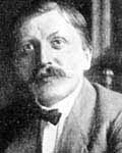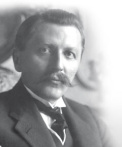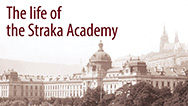Important personalities
5. 11. 2010
Vlastimil Tusar (18 October 1880 - 22 March 1924)
When we are thinking about the personality of Vlastimil Tusar, who is nearly unknown nowadays in fact, perhaps the most felicitous characteristic is that he was an individuality who stepped over given limits. There is a story from the period prior to the First World War which perhaps most tellingly supports this statement. Tusar, a well-known member of parliament for the Moravian Region, was invited, as the most important Moravian social democrat, to a ball organized by the Governor. Up to then there had been a rule that social democrats had used to reject such invitations on principle. They had not wanted to compromise themselves with the ruling power and they had wanted through this attitude to demonstrate how deep abyss there had been between the top social classes of high officials, aristocrats or political representatives and ordinary workers whose standard of living had been far lower. However, Tusar decided to choose a different approach. Not only that he participated in the ball, but he even asked the Governor's consort for dance and thus caused a great social sensation. Probably, he intended by this action to make obvious that Social Democratic Party, up to then a political party which had been rejected to a certain extend, was present and that it was necessary to realize it. And social democrats consecutively gained a position of one of the most important and the most powerful political subject in the state.
As it has been mentioned, Tusar is nowadays a politician who is unknown, in fact. Probably it is because of the fact that his predecessor was Karel Kramář who was appointed as the first Prime Minister of the new state. In spite of the fact that he did not sparkled in his position much, he was the first. In combination with his favourable fate, he was very attractive for the public. Also the Tusar's successor Antonín Švehla, if we omit two Prime Ministers of caretaker cabinets, was a politician and statesman of high calibre. It is possible to state that he, together with Masaryk and Beneš, ranked among the most significant politicians of 1920´. Both Kramář and Švehla are well-known and their lives are described by historians. Tusar remains in their shadow. Apart from several entries in encyclopaedias and one small book written by a renowned historian Zdeněk Kárník, it is nearly impossible to learn anything about him in fact. Nevertheless, we should not be confused by this. Tusar stood out among other politicians of his political party and apart from small exceptions we can state that the Social Democratic Party did not have in that period any other politician who would outdo him. His activities in the position of the Prime Minister were exceptional as well. Tusar's cabinet finished formation of the state and prepared it for perhaps the most significant internal conflict in its initial stages which could have markedly destabilized its position. By this conflict I mean the rupture in the most powerful political party – in the Social Democratic Party. The left wing of the party, which later became a core of the Communist Party, threatened by revolution but thanks to Tusar's measures the revolution was forestalled. But first things first. Vlastimil Tusar undoubtedly deserves to be known and spoken about.
Vlastimil Tusar was born in 1880 in a rather poor family. In spite of that, he began to study at a grammar school. However, then very prevalent disease – tuberculosis – affected his life during studies. First he lost his mother and later also his father. Therefore it was necessary for orphaned Tusar to get a more practical education in a field which would support him He started to study at a commercial college. After finishing his studies, he began to work as a shop assistant. However, he did not do this job long. Thanks to his membership in trade unions he later worked as a secretary of one of trade union and then he began to work for the Dělnické knihkupectví a nakladatelství (Worker's Bookshop and Publishing House).
Tusar was a great autodidact, he was fond of reading and he educated himself. He also soon showed his organizational skills. Thanks to that, the Social Democratic Party, the owner of the above-mentioned bookshop, sent him to Moravia where he was, as a new editor of the Brno daily "Rovnost", not only to manage the editors' team but also to participate in the development of the party in this region. Tusar get involved in the events in Moravia very eagerly. Times of the first decade of the 20th century were very turbulent. A great struggle for universal suffrage, one of greatest objectives of the biggest left-wing party, broke out in the monarchy. Social democrats realized well that removal of the existing unjust electoral system which preferred rich people would strengthen their party. The party had on one hand large number of sympathizers but they came from the poorest social classes. This fact caused that the power of the party could not be fully showed. The actions of the party brought success and in cooperation with other political subjects it was possible to push through this historical change in 1907. During these efforts Tusar showed his negotiating skills and he also proved to be a good political agitator, in the good sense of the word.
Apart from the struggle for universal suffrage, Tusar was also involved into the struggle for so-called Moravian Pact. At that time, apart from the nation-wide parliament, each country of the monarchy had its own legislative body. Also members of these smaller parliaments were voted according to unjust curial electoral system which preferred the rich classes. Unlike Bohemia, where due to disputes between Czechs and Germans it was not possible to change this system, politicians managed to agree on the change in Moravia. The change was not very favourable for social democrats and the Rovnost daily headed by Tusar strongly opposed to it. But it came into force anyway and it was more favourable for social democrats than the previous system.
Tusar was not able to stand as a candidate for parliament as he had not reached the 30-years limit and thus he had not right to be elected. But in 1911 this limit was revoked, and Tusar became a candidate for the Austrian Reichsrat - the parliament of the Austria-Hungary the seat of which was in Vienna. He managed to gain the mandate and he became a Member of Parliament. In 1913 he became also a Member of Parliament of the Moravian Regional Assembly. Before the First World War he was de facto the head of the Moravian part of the Social Democratic Party and he ranked among the most significant Moravian politicians.
The outbreak of the First World War was for the Czech politics (let us include under the term Czech also the Moravian political representation) an extraordinary complicated period. Since the half of the 19th century, the Czech nation had gradually gained number of privileges, for example it had its own schools and such like. However, the war brought not only a danger of their losses but also the threat of absolute political marginalization of the Czech nation as Germans wanted to get control over the Austria-Hungary. And that was not good news for Czechs. It was necessary to seek a way how to cope with the situation. Some of them, for example Tomáš Masaryk, chose the revolt and tried to form the independent Czech state. Leaders of the Social Democratic Party headed by Bohumír Šmeral chose a loyal approach. It was not clear then how the war would turn out and thus such an approach was quite logical. In case of victory of Germany, and its ally Austria-Hungary, the position of the Czech nation would be very difficult. A group of social democrats which pushed through the loyal approach would be in such a case able to save the day. Tusar supported this approach.
It was necessary to do something for the protection of Czech interests as the situation within Austria-Hungary was very worsening. In 1916 the Czech Union was established, which was an organization representing nearly all the Czech Members of Parliament of the Austrian Reichsrat. It was a turning point. Social democrats became to cooperate at the top level with so-called bourgeois parties. Up to then it had been nearly inconceivable. Tusar was elected an acting secretary of this newly established organ. It was a very important function and he was mostly staying in Vienna where coordinated the Czech policy.
However, Tusar's attitude became gradually changing and in the last phase of the war he inclined to the side of objectors of loyalty. Very important for his opinion reversal was perhaps his stay at the international conference of trade unions in Switzerland in 1917 which the government allowed him to attend. Later information concerning the speculation that he was instructed by Masaryk are rather something that belongs to the empire of legends. On the other hand, it is not possible to deny that information gained from a participant of the revolt could change the Tusar's attitude. In 1918 he was already fully on the side of supporters of formation of a new state and was involved in number of significant actions of the internal policy. He also became a member of a newly established National Committee, which was a coordination body of the internal policy and later became a basis for the formation of the first Czechoslovak Parliament.
Tusar did not participate in the October events. Based on the decision of leaders of the National Committee, he was to stay in Vienna and become an intermediary between the Czech politicians and bodies of the disintegrating monarchy. From this position, he coordinated and controlled separation of the central state bodies of the monarchy. Nowadays this task may appear to be unimportant, but it is necessary to realize that since 1526 the Czech Lands had been a part of the Hapsburg Monarchy. There were lots of problems which concerned the position of German minority in the emergent Czechoslovakia, the Austrian war debts up to the seemingly marginal problem as it was the separation of archives. Tusar was trying to solve all the matters and it is necessary to admit that he was very successful.
Successful performance at the above-mentioned post predetermined Tusar to be considered as a possible minister. However the situation in the state was very complicated. Municipal election in spring 1919 showed that pre-war preferences of voters had changed. The elections meant landslide victory of both socialist parties – the Social Democratic Party and National Socialist Party, together with Agrarian Party. On the other hand, the party of the Prime Minister Kramář was not successful and this situation reflected in the government. The government resigned and it was necessary to find a new Prime Minister who would exchange Kramář in his post. Finally it was just Tusar who was chosen. In his favour spoke the fact that he was a member of the most powerful political party, which was likely to win the first general election. Furthermore, thanks to his work in Vienna, he was known as very smart politician who was able to reach a compromise. On 8 July 1919 the President Masaryk appointed Tusar the second Czechoslovak Prime Minister. He was the only one Prime Minister who in the period of the First Republic came from the Social Democratic Party. Thanks to Tusar, this party made a great step which would have been inconceivable some years before. The party became not only the government party but also the party which presided over the government. Apart from social democrats, the cabinet was constituted of members of the Agrarian Party and National Socialist Party. Because of this composition, this government is also called as the government of red-green coalition, where red represents socialist parties and green Agrarian Party.
It is not possible to describe all the Tusar's steps in the Prime Minister's chair. A detailed analysis of his performance in the government would have to supply the history of Czechoslovakia of that period and it is not possible within the scope of this article. Zdeněk Kárník, a Tusar's biographer, mentions in his book three basic Tusar's deeds which should be pointed out here.
The first serious problem was the national issue of the newly constituted state. The first things hot for Tusar prepared Slovaks, in particular the leader of the most powerful political party Andrej Hlinka. He set his hopes to the idea of Slovak autonomy and set to Paris at the peace conference to gain support to his plan. It is not necessary to mention, what would have his speech at the conference meant for the Czechoslovak foreign policy. Finally, Hlinka not only that he was not allowed attending the conference but he was even deported from France. Further problems were to be expected from the side of Czech Germans. Their efforts for territorial separation had been suppressed long time ago and so, the issue of their position in the Czechoslovak Republic became an item of the agenda. Tusar, during talks with representatives of German political parties, proved that it was an intransigent politician. He rejected inappropriate demands and called German representatives to be fully involved in the formation of the state.
Further problem was the issue of socialization of means of production. The end of the war radicalized the entire society and it wishes deep leftist reforms. This slogan was then adopted by the entire society and even right-wing parties had it in their programme. However that theoretical requirement was not possible to implement in the practice. The initial enthusiasm of politicians soon calmed as there were number of negative aspects there. There were fears of the response of western powers whose support the state badly needed. It was also clear that the change of the property situation would bring about problems in production which would result in difficulties in the social area. Czechoslovakia had lots of problems anyway and it would be hazardous to add another one. The plan began to be gradually abandoned. But the problem was how to explain negative aspects of the socialization to citizens. The government tried to soothe voters through certain steps which were presented as the first stage of socialization, it concern for example establishing factory councils which had right to control the production.
The third area, which was critical for Tusar and for the new state, concerned relations inside the most powerful party, in the Social Democratic Party. A new wing became to be formed within the party and was gradually striving for getting control over the entire party. It was influenced by ideas of the Bolshevik revolution in Russia. It rejected participation in the government and pushed through radical leftist reforms or even the revolution. It was a precarious situation for Tusar. As a state representative he had to defend its interests and on the other hand he could not set considerable part of his party against the government which he chaired. The situation required manoeuvre. Some of Prime Minister's steps may seem to us to be not very consistent. But we must view them in the context of that time. Tusar did his best and tried to maintain stability of the state. Peace talks in Paris had not finished yet after all, and it was very important to maintain Czechoslovakia as an island of peace and stability in turbulent Europe.
Tusar managed to lead the state up to the adoption of a new constitution. It defined the composition of top bodies, in particular the government, president and parliament. That is why the general elections were held without delay. It was the Social Democratic Party which won in the elections. Tusar automatically became a candidate for the post of the Prime Minister. It was supposed that owing to the election results, the coalition will be renewed. But the problem was that in the framework of the Social Democratic Party there were two parties in fact – the left wing and the right wing. Both wings were striving for the control over the entire party. The left wing had fever members in the parliament but it had more members in the party. The left-wing members of parliament did not want the party to continue in its participation in the cabinet. The fate of the cabinet was hanging in the balance. Tusar lead number of negotiations because the state needed the government with the parliamentary majority. The vote of confidence was very dramatic until the last moment and it was surprising that the government won the confidence in the end. The left-wing MP's finally voted for the government, but there was a condition that of the definite participation in the government would be decided during the congress of the party which was scheduled for September 1920.
The above-mentioned congress became finally pretence for the solution of the intraparty situation. There were threats that the left wing would get control over the party and it would be really deadly dangerous for the state. The problem was that it was impossible to gain votes of MP's of national minorities who opposed to it. That is why it was impossible to form a new government without social democrats. It was very important for the party to remain a reformist and pro-state party which would avoid a radical leftist programme which the left wing wanted to push through after seizing power. All top political representatives including President Masaryk were involved in the solution of the situation. It was decided that Tusar would resign so that right-wing politicians would not be, from the point of view of their party colleagues, bound by the participation in the government. It was apparent that there would be a split in the party which would weaken it for a long time. The right wing had not power enough to defeat the left wing and the party had to be split. Tusar showed his statesmanship in these days again. He sacrificed interests of his party in favour of the state as he was its Prime Minister. The left wing became a basis of the Communist Party and thus the Social Democratic Party lost not only majority of its members but also voters. In the course of history of the First Republic it did not become the most powerful party any longer. They were agrarians who acquired that position.
Because of this disagreement, Tusar, who had never sound health, suffered from serious health problems. After his resignation he left for Germany to a health resort. He never returned to the top politics although he was several times considered as a candidate for various posts. After recovery he became an Ambassador of Czechoslovakia to Germany. It was a very important and prestigious post. Owing to the economic links to Germany it is possible to say that it was one of key posts within the Czechoslovak diplomacy. Tusar proved to be a smart diplomat and he was very useful for Czechoslovakia. Thanks to his qualities, among which we can include his social tact, he soon managed to make number of valuable contacts which he used in favour of the state. His abilities were appreciated by the Minister of Foreign Affairs Edvard Beneš who did not used to praise people very much. In particular there were appreciated Tusar's activities which were not limited only to the Germany area. In spite of the defeat in the war, Berlin remained an important diplomatic centre where contacts were made and information from the whole world was gained. It was just information which Tusar managed to acquire and send to Prague where it became a basis for our concept of the foreign policy.
As I have mentioned, Tusar suffered from various health problems which were worsening by his working stress and strain. One of his working affairs became fatal for him in the end. In 1924 Czechoslovakia was negotiating a crucial treaty with France. Alliance with this country was Alfa and Omega of the Czechoslovak foreign policy. The treaty incurred displeasure of Germany of course and thus Germany tried to slander the Czechoslovak foreign policy through publishing untrue data from the treaty. Thanks to that, Czechoslovakia should have looked nearly as a warmonger. Tusar took resolute steps to set the situation to rights. Unfortunately, strain and stress caused that he got serious heart attack after which he did not recover consciousness any more; he died on 22 March 1924. As Zdeněk Kárník adds – it is not possible to avoid rather pathetic words when describing the death of this politician who did not like pathos. Tusar really died as a soldier of the Czechoslovak diplomacy, he died for the state which he served.
It is rather difficult to assess, with the benefit of hindsight, some steps of Vlastimil Tusar and to assess his legacy is even more difficult. What should not be forgotten, at least from my point of view, is the fact that Tusar was willing to sacrifice interests of his political party and his own interests for the interests of the state. Thanks to that, we can rank him among the most significant politicians of the third decade of the 20th century and perhaps of the Czech history as a whole. How many such politicians would we able to find in our history and in the current politics, after all? I think they would be only a few.








